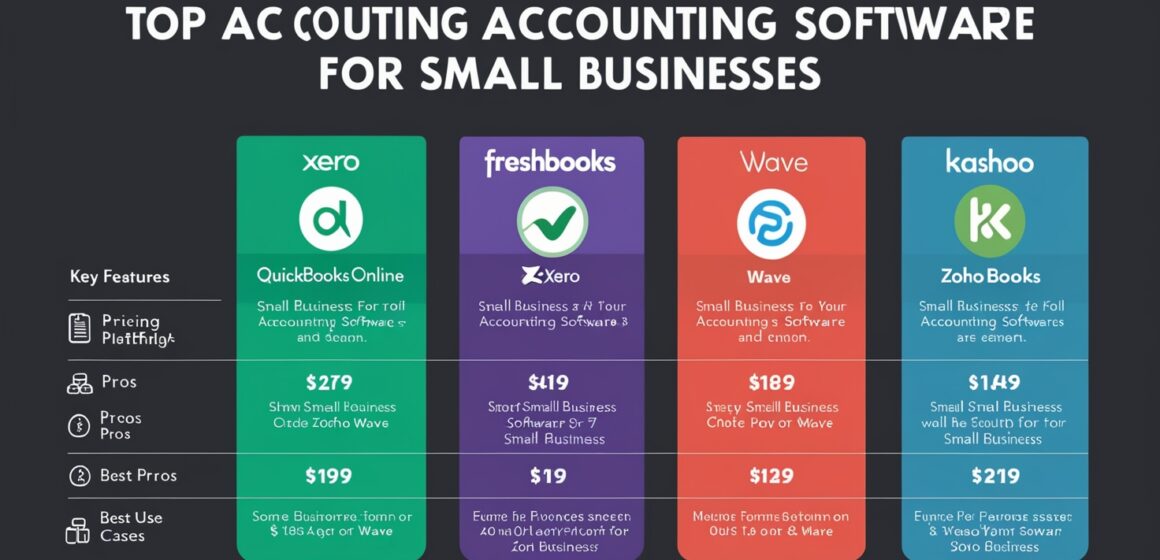Managing finances effectively is one of the most critical aspects of running a small business. With numerous accounting software options available, choosing the right one can help streamline operations, save time, and ensure financial accuracy. Here’s a guide to the best accounting software for small business owners, tailored to fit various needs and budgets.
1. QuickBooks Online
- Best for: Overall functionality and scalability.
- Features:
- Invoicing, expense tracking, and payroll integration.
- Customizable reports and dashboards for financial insights.
- Mobile app for on-the-go management.
- Pros:
- User-friendly interface.
- Extensive integrations with third-party apps.
- Scalable for growing businesses.
- Cons:
- Higher cost compared to some competitors.
- Learning curve for advanced features.
- Pricing: Starting at $25/month.
Why It Stands Out:
QuickBooks Online is a versatile solution that adapts to businesses of all sizes, offering robust features for managing day-to-day finances and long-term growth.
2. Xero
- Best for: Small businesses with international operations.
- Features:
- Multi-currency support.
- Inventory management.
- Real-time bank feeds and reconciliation.
- Pros:
- Affordable pricing tiers.
- Unlimited users on all plans.
- Strong focus on collaboration.
- Cons:
- Limited customer support options.
- Fewer features for U.S.-based payroll.
- Pricing: Starting at $13/month.
Why It Stands Out:
Xero is ideal for businesses working globally, offering seamless multi-currency management and collaborative tools for distributed teams.
3. FreshBooks
- Best for: Service-based businesses and freelancers.
- Features:
- Time tracking and project management.
- Simple invoicing and payment collection.
- Expense categorization with receipt storage.
- Pros:
- Easy to use, even for non-accountants.
- Built-in time tracking for billing clients.
- Excellent customer support.
- Cons:
- Limited functionality for inventory-heavy businesses.
- No native payroll feature.
- Pricing: Starting at $17/month.
Why It Stands Out:
FreshBooks simplifies accounting for freelancers and service-based businesses, focusing on ease of use and project billing.
4. Wave
- Best for: Small businesses on a tight budget.
- Features:
- Free invoicing, receipt scanning, and expense tracking.
- Bank account integration for automatic reconciliation.
- Basic financial reports.
- Pros:
- Free core features with no hidden costs.
- Simple and intuitive interface.
- Ideal for startups and solopreneurs.
- Cons:
- Limited scalability and advanced features.
- Paid add-ons for payroll and payment processing.
- Pricing: Free (additional services at extra cost).
Why It Stands Out:
Wave provides powerful tools for free, making it a great choice for small businesses that need basic accounting functionality without the overhead costs.
5. Zoho Books
- Best for: Small businesses already using Zoho apps.
- Features:
- End-to-end accounting solutions, including tax compliance.
- Seamless integration with Zoho CRM and other tools.
- Customizable reports and automation.
- Pros:
- Affordable pricing tiers.
- Comprehensive automation options.
- Excellent customer support.
- Cons:
- Limited third-party integrations outside the Zoho ecosystem.
- Payroll only available in certain countries.
- Pricing: Starting at $15/month.
Why It Stands Out:
Zoho Books is a natural fit for businesses already invested in Zoho’s ecosystem, offering seamless integration and robust features at an affordable price.
6. Kashoo
- Best for: Simple, no-frills accounting.
- Features:
- Simplified invoicing and expense tracking.
- Automatic categorization of transactions.
- Real-time reporting and insights.
- Pros:
- Easy to set up and use.
- Excellent customer service.
- Ideal for sole proprietors and micro-businesses.
- Cons:
- Lacks advanced features like inventory management.
- Limited integrations with other software.
- Pricing: Starting at $20/month.
Why It Stands Out:
Kashoo is perfect for those seeking a straightforward accounting solution without unnecessary complexity.
How to Choose the Right Accounting Software
When selecting accounting software for your small business, consider the following:
- Business Size and Complexity:
- For larger operations, go with scalable options like QuickBooks or Xero.
- For simpler needs, consider Wave or Kashoo.
- Budget:
- Free or low-cost options like Wave can help startups save money.
- Specific Needs:
- Service-based businesses may benefit from FreshBooks’ time-tracking features.
- Global businesses can leverage Xero’s multi-currency support.
- Integrations:
- If you use other business tools, ensure the software integrates seamlessly.
- Ease of Use:
- Non-accountants may prefer intuitive platforms like FreshBooks or Kashoo.
Conclusion
The best accounting software for your small business depends on your unique needs, budget, and growth plans. Whether you’re a solopreneur looking for free tools or a growing company needing advanced features, there’s an option tailored for you. By investing in the right software, you can save time, stay organized, and focus on what matters most—growing your business.




Leave a Reply